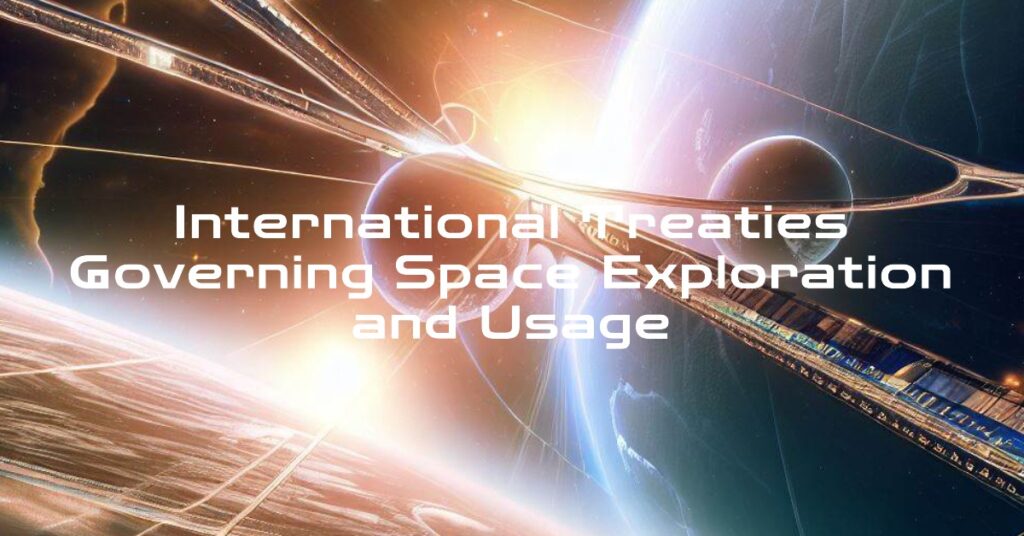International Treaties Governing Space Exploration and Usage
Space exploration has always captivated the human imagination, pushing the boundaries of our knowledge and opening up new frontiers. As the pursuit of space exploration continues to evolve, it becomes increasingly important to establish frameworks and agreements that govern the exploration and usage of outer space. In this article, we will explore the international treaties that play a crucial role in regulating space activities and promoting cooperation among nations.
1. Outer Space Treaty (1967)

The Outer Space Treaty, formally known as the Treaty on Principles Governing the Activities of States in the Exploration and Use of Outer Space, including the Moon and Other Celestial Bodies, serves as the cornerstone of international space law. Adopted by the United Nations General Assembly in 1967, this treaty aims to ensure the peaceful and cooperative use of outer space.
Key Provisions:
- Peaceful Use: Outer space shall be used for peaceful purposes, and any activities should be carried out in a manner that avoids the harmful contamination of celestial bodies and the introduction of weapons into space.
- Common Heritage: Outer space, including the Moon and other celestial bodies, is the common heritage of mankind, and its exploration and use shall benefit all countries and humanity as a whole.
- Non-Appropriation: No nation can claim sovereignty over any part of outer space or celestial bodies.
- International Responsibility: States are internationally responsible for the activities of their national space agencies, including activities conducted by non-governmental entities under their jurisdiction.
- Sharing of Information: States are encouraged to share scientific data and information concerning outer space, promoting cooperation and the advancement of scientific knowledge.
The Outer Space Treaty sets the foundation for the peaceful and cooperative exploration and use of outer space. It has been ratified by over 110 countries, making it a widely accepted framework for space activities.
2. Rescue Agreement (1968)

The Rescue Agreement, formally known as the Agreement on the Rescue of Astronauts, the Return of Astronauts, and the Return of Objects Launched into Outer Space, complements the Outer Space Treaty by establishing procedures for the rescue and return of astronauts in distress and the return of space objects.
Key Provisions:
- Rescue of Astronauts: Parties to the agreement are required to provide assistance and take all possible measures to rescue astronauts in distress and return them safely to their country of origin.
- Return of Objects: States are obligated to return space objects, such as satellites or spacecraft, launched into outer space if they are discovered by another country.
The Rescue Agreement emphasizes the importance of cooperation and mutual assistance in the event of emergencies or accidents during space missions.
3. Liability Convention (1972)

The Liability Convention, formally known as the Convention on International Liability for Damage Caused by Space Objects, addresses the issue of liability for damage caused by space objects.
Key Provisions:
- Absolute Liability: States that launch or procure the launching of space objects are absolutely liable for any damage caused by their objects on the Earth or in outer space.
- Joint Liability: If damage is caused by a space object launched by one country but operated by another, both states share joint liability.
- Financial Coverage: States are required to provide compensation for damage caused by their space objects.
The Liability Convention establishes a framework for addressing the legal aspects of space object damage and ensuring that states take responsibility for their space activities.
4. Registration Convention (1975)
The Registration Convention, formally known as the Convention on Registration of Objects Launched into Outer Space, requires states to register their space objects with the United Nations.
Key Provisions:
- Registration Requirement: States must register any space objects they launch or intend to launch, including details such as the purpose of the launch, its basic orbital parameters, and the country responsible for its launch.
- Publication and Recording: The United Nations maintains a register of all registered space objects and publishes relevant information to ensure transparency and facilitate international cooperation.
The Registration Convention promotes transparency and serves as a means of tracking space objects to prevent collisions and enhance safety in outer space.
5. Moon Agreement (1979)

The Moon Agreement, formally known as the Agreement Governing the Activities of States on the Moon and Other Celestial Bodies, addresses the exploration and use of the Moon and other celestial bodies.
Key Provisions:
- Common Heritage: The Moon and its resources are the common heritage of mankind, and their exploration and use shall benefit all countries and humanity as a whole.
- Restrictions on Exploitation: The Moon Agreement prohibits any commercial exploitation of the Moon’s resources without an international framework in place to govern such activities.
- Environmental Protection: States must take measures to prevent the disruption of the Moon’s natural environment and avoid adverse changes to its surface.
The Moon Agreement emphasizes the responsible and sustainable utilization of lunar resources and encourages international cooperation in lunar exploration and activities.
6. Space Debris Mitigation Guidelines (2007)
While not a formal treaty, the Space Debris Mitigation Guidelines established by the United Nations provide recommendations for spacefaring nations to reduce the creation and impact of space debris.
Key Recommendations:
- Limiting Debris Generation: Space agencies are encouraged to design satellites and rockets with measures to minimize the creation of space debris.
- Post-Mission Disposal: Spacecraft and upper stages should be removed from orbit or moved to graveyard orbits after completing their missions to reduce the risk of collisions.
- Debris Monitoring and Tracking: States are encouraged to share information and enhance the tracking of space debris to avoid potential collisions.
The Space Debris Mitigation Guidelines promote responsible practices to minimize the creation and impact of space debris, ensuring the long-term sustainability of space activities.
Frameworks & the Future
The governance of space exploration and usage is supported by a framework of international treaties and agreements. These agreements establish guidelines for peaceful, cooperative, and responsible conduct in outer space. From the Outer Space Treaty’s principles of peaceful use and common heritage to the Liability Convention’s provisions on liability and compensation, these treaties provide a foundation for international cooperation and the protection of our shared interests in space. As space exploration advances, these agreements will continue to evolve, addressing new challenges and facilitating the exploration and utilization of outer space in a manner that benefits all of humanity.

C M, a seasoned editor, journalist, and consultant, is deeply fascinated by the convergence of technology, space, and the future of humanity.
With a particular interest in transhumanity, futurology, and the philosophical and ethical dimensions of these domains, C M serves as the lead contributor to SpaceSpotlight and TranscendSphere.
When not penning insightful articles on these rapidly evolving fields, C M indulges in their love for podcasts and books, proudly embracing their status as a ‘Happy Nerd Extraordinaire!’



